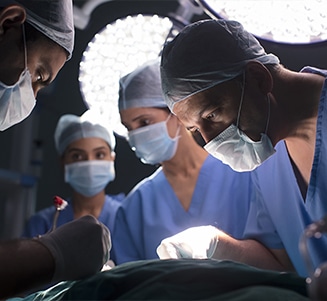Appointment
Please Select the type of appointment you would like to book
Admission Guidelines
Please contact the Admission Counter for room reservation along with the doctor’s admission request. In case of emergency, you will be first admitted in the Emergency unit before being shifted to the room. During your stay in the hospital, you are allowed to have one attendant to stay with you. However, adult patients opting for Suite rooms and Paediatric patients less than 2 years old are allowed to have two attendants. Rooms are provided with a couch to facilitate the attendant’s stay. Paediatric patients more than 2 years old are allowed to have two attendants with doctor’s permission and advice.
Attendants are advised to vacate the respective rooms or ward and wait at the 3rd floor waiting area when the patient is shifted to Operating Rooms, Intensive Care Units. When the patient is shifted to ICU and the room is retained by the attendant, the rent for the room will be charged. This however is allowed subject to the availability of rooms after meeting other patient requirements. Beds or rooms are allotted according to your preference but will depend on the availability. Sometimes it will involve a waiting period or offer of differential room tariff. Please bear with us for any inconvenience. Please note that the treatment cost is depending on the room category that you choose. Payments for the package opted are to be made at the time of admission. For availing credit facility, necessary authorization and credit letter from the company need to be submitted at the billing section at the time of admission.
Admission Steps
Frequently Asked Questions regarding Admissions
When I arrive at MGM Healthcare for admission where do I go?
When you arrive at MGM Healthcare, if you are driving your own car, you can park in the visitor parking garage. Please go to the reception and inform that you have come for admission for a surgery/procedure. They will guide you to the admissions desk. At the admissions desk they will guide you through the check-in process, until you reach your room and settle in comfortably.
What happens during admission process?
Once you arrive at the admissions desk, the staff will take your medical file and reports and brief you on the formalities that you need to complete at the admission desk before you can check-in to your room. Once you complete those procedures and are admitted, a bracelet identification band will be put on your wrist. Please check if all the details on it are accurate and wear it while you are in hospital. Our support staff will then show you your room and bed, where to put your belongings and how to operate the bed and nurse call controls. If you have any questions or if you are not clear about any information given to you, please let our nursing staff know. All personal information is held in strictest confidence.
What things can I bring for my stay at the hospital?
The following is a check-list of the things that you can bring to the hospital on the day of admission
- Your hospital files
- Your medical and diagnostic reports
- Your health insurance card and other documents/details required for insurance claim submission
- Non-slip slippers/footwear
- Sleepwear, comfortable day wear and underwear. Please bring enough for your hospital stay or arrange for your family to launder and return items to you
- Toiletries (toothbrush and paste, hair brush, comb, soap etc).
- Spectacles, hearing aids and dentures, if you use any of them
- Mobility aid, if you use any
- Prescription of the medicines that you are taking currently. We will take care of administering your routine medication as well.
- Books and magazines that you can read while you are recovering during your stay in the hospital
- Mobile and other electronic devices
- If you are a maternity patient, check with the hospital for any specific items you need to bring.
Please remember:
- To not bring any jewellery, other valuables and large amounts of cash.
- That you are responsible for your belongings.
- The hospital follows a no-smoking policy and is a no-smoking zone.
What about diet/food during my stay in the hospital?
Based on your medical condition and physical needs, our nutritionist will prescribe a special diet for you after consulting with the doctor. Post-surgery, you will not be allowed to eat or drink anything until the effects of anaesthesia completely wears out. When you start your food, you will be restricted to water followed by clear liquid diet at first, until the staff is sure that your body will be able to handle solid foods. It is not a good idea to bring food from home until your medical team has agreed that is okay,
Who will be allowed to stay with me after surgery
and during my stay in the hospital?
Any of your family members, friends or care taker can stay with you in the hospital post-surgery. Only one person will be allowed to stay with you in the room throughout the day during your stay in the hospital and while you are recovering. Please note that if any signature is required in the consent form, it should be authorized only by the patient’s family.
We understand that visitors do play an important role in providing emotional and moral support to the patients while they are recovering. However, they are allowed only during designated hours. Please read our visitor guidelines before coming to the hospital.
Preparing for Surgery
It is very important to prepare yourself both emotionally and physically before you admit yourself in the hospital for any surgical treatment. The level of preparation required will largely depend on what type of surgery you are going to have and the type of anaesthesia that will be given. Please feel free to discuss the following with your doctor or surgeon before your procedure.
- Discuss with the doctor/surgeon very clearly and understand the benefits, risks and expectations of the procedure.
- Ask the doctor what type of anaesthesia will be given and how long will it take to recover from it. If you have any fear or concerns regarding anaesthesia or the surgery itself, please discuss it upfront with the doctor.
- Clearly tell your doctor any regular medicines that you are currently taking, as well as any prior procedures, history of chronic illnesses, or allergies you may have.
- Some surgeries might warrant specific bathing, shaving, or cleaning instructions. Please follow that carefully.
- The doctor will advise you to stop drinking and eating for a certain time period before and after surgery. Please ensure that you follow this diligently.
- Do not wear any eye contacts, make-up, jewels on the day of your surgery.
- Do let the nursing staff know of dentures or other prosthetic devices you may be wearing.
- Clearly understand any post-operative instructions that need to be followed (for example, changing dressings, post-op medicines, follow-up appointments).
- Practice the post-operative exercises your doctor recommends. You will need to do them during and after your hospital stay.
- Talk to the personnel at the insurance desk and arrange for information required from your end to be provided for insurance claim.
- Arrange for a ride home after your procedure, especially if it’s an out-patient procedure and if you can go home after the procedure the same day.
- Prepare yourself emotionally by practicing relaxation exercises, perform deep-breathing exercises, think positively and creatively visualize a successful surgery and recovery.
- Learn about how to cope with pain and manage pain post-surgery and during recovery.
- Do not shy away from discussing with your doctor any concerns you might have about the treatment plan and recovery pathway. Our team of doctors, nursing staff and counsellors are highly empathetic and know that your worries are important no matter how silly you think they are and will give you the personalized care and attention that you deserve during your journey back to good health.
Frequently Asked Questions
What is out-patient surgery and inpatient surgery?
An out-patient surgery is also known as ambulatory surgery or same-day surgery. Once the surgery is done, you will be monitored in the recovery room for some time and will be discharged the same day post recovery. You will need someone to drive you back home.
In-patient surgery will require admission in the hospital a day before or on the day of the surgery. You will remain the hospital for a few days post-surgery and your recovery will be monitored. Once the medical team is satisfied with the recovery progress, they will be ready to discharge you. Upon discharge, please ensure some is there to drive you back home and you are very clear about guidelines to follow at home for complete recovery.
Who all from the medical team will be involved during my surgery?
Depending on the type of surgery you will be undergoing, a team of medical experts across specialities will together to care for you before, during and after your surgery. Nursing staff, rehabilitation staff, physiotherapist and nutritionists will work closely with the medical team during the recovery period post-surgery. Anaesthesiologist will work closely with surgical team and will be in charge of giving anaesthesia, checking its effect and continuously monitoring your during the surgery till the effects of anaesthesia wears off post-surgery.
What steps can I take to ensure my surgery goes smoothly?
It is very important to quit smoking at least for 2 weeks before your surgery. Please discuss clearly with your doctor if you are taking medication. Understand what can be taken before or after the operation. Discuss both the regular prescription medication and over-the-counter medication like supplements, vitamins, herbs, etc that you take regularly. Some medicines and supplements should not be taken before an operation. Others may conflict with other medication prescribed for you. If you have diabetes, please ensure that you are maintaining a good control of your sugar levels before surgery to improving healing time. Follow the diet instructions that will be given to you before surgery.
What is informed consent?
Your healthcare professional will clearly explain to you in detail what is involved in your treatment in terms of the procedure, its benefits, risks and expected outcomes. You will then be asked to sign a consent form before undergoing surgery. This process is called informed consent. This form says that you were involved in the decision-making process with your health care professional. Read the consent form carefully before signing. Please ask any questions if you do not understand something. Many times, the consent form will be asked to be signed by the patient’s immediate blood relation closely associated with the patient.
What happens during a pre-surgery check-up?
Your doctor might prescribe for specific tests and physical exam to be done, a week or two before the surgery before they can decide on the surgery dates. If there are any changes to your health, medication, symptoms that happen before your operations, even minor infections or cold, please inform your doctor.
How should I prepare myself a day before the surgery?
The healthcare professional will give you clear instructions to follow before you get yourself admitted for surgery. Depending on the type of surgery you will be undergoing you will be asked to start/stop medication, may be recommended a laxative, will be asked complete your meals before a particular time and may be told not to eat or drink anything for 6 to 12 hours before surgery. If you have diabetes, ask the health care professional when you can have your last meal. You also can discuss which medicines you may take with a sip of water on the morning of surgery.
What happens just before surgery?
Just before the surgery, the nursing staff will come and prepare you for the surgery. Pre-operative preparations include the following:
- Removing jewellery, dentures, bridges, hearing aids, spectacles, contact lenses, wigs, hairpins, any other hair accessories that you may be wearing.
- You will change into a hospital gown and a cap for your hair will be given.
- Any medication that needs to be administered before the surgery as per doctor’s instructions.
Once all these preparations are done in your room, you will be wheeled into the operation theatre where the following preparations will be done:
- A healthcare professional will confirm your name, birth date, and type of surgery before you go to the operating room.
- The Anaesthesiologist will explain what type of anaesthesia you will be receiving.
- An intravenous line (IV) will be placed into a vein in your arm or wrist. Through this line, your body will be supplied with fluids, medication or blood during and after the surgery.
- You may be given medication that will help you relax. You may also be given other medication, such as antibiotics to reduce the risk of infection.
What happens once I am in the operating room?
At the operating table, once the basic preparations are done, monitors will be attached to various parts of your body to measure your pulse, oxygen level, and blood pressure. The surgical team will reconfirm your name, date of birth, and what operation you are having. A final review of medical records and tests may be done. This final confirmation is called a “time-out,” and it is done for your safety before you are given a sedative. The anaesthesiologist will administer anaesthesia. A tube called a catheter may be placed in your bladder to drain urine.
What happens after the surgery is over?
Once the surgery is over, you will be moved to the recovery room. This room is equipped to monitor the patient post-surgery. As soon as you wake up after the anaesthesia effect wears out, if you have been given general anaesthesia, you may feel groggy, confused, chilly. Let a health care professional know if you have a headache or nausea. You may have muscle aches or a sore throat shortly after surgery. You may also experience some pain. All these problems should not last long. You can request the doctor for some pain management medicines. You will remain in the recovery room until you are stable. The nurse will continuously monitor you closely. You may be given antibiotics and other medicines via the IV line. You will then be shifted to your room or ICU depending upon your condition.
How soon can I move around after surgery?
This largely depends on the type of surgery that you are undergoing. But, as soon as possible, post confirmation from your doctors, your nurses will come and help you move around as much as you can. You will be supported and encouraged to get out of bed and slowly take that first step and walk around. You may feel tired and weak at first. The sooner you resume activity, the sooner your body’s functions can get back to normal.

 In-person Consultation
In-person Consultation Online Video Consultation
Online Video Consultation Treatment Enquiries
Treatment Enquiries Find a Doctor
Find a Doctor Access the Patient Portal
Access the Patient Portal +91 44 4524 2407
+91 44 4524 2407  Minimal Access GI & Bariatric Surgery
Minimal Access GI & Bariatric Surgery Multi-Visceral and Abdominal Organ Transplant
Multi-Visceral and Abdominal Organ Transplant Neurology
Neurology Spine Surgery
Spine Surgery Total Knee replacement
Total Knee replacement Anaesthesiology & SICU
Anaesthesiology & SICU Paediatric Cardiology
Paediatric Cardiology Emergency Na MGM
Emergency Na MGM IVF
IVF Oncology Treatments
Oncology Treatments






